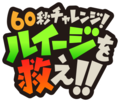List of television series and films: Difference between revisions
Apikachu68 (talk | contribs) m (→Television series: Better quality.) |
|||
| Line 202: | Line 202: | ||
FSaT Hilarious Nintendo amiibo Stories in a Silly Sock Puppet Theater thumbnail.jpg|''[[Frizzy's Silly amiibo Theater]]'' (YouTube) | FSaT Hilarious Nintendo amiibo Stories in a Silly Sock Puppet Theater thumbnail.jpg|''[[Frizzy's Silly amiibo Theater]]'' (YouTube) | ||
Virus Vid June 18-1 thumb.jpg|''[[Virus Vid]]'' (YouTube) | Virus Vid June 18-1 thumb.jpg|''[[Virus Vid]]'' (YouTube) | ||
B&A Thumb Colors & Action Bricks.jpg|''[[Ben & Amy]]'' ({{wp|Lego|LEGO}} website / {{wp|Lego Life|LEGO Life}}) | |||
60BCLOS Logo.png|''[[60-Byō Challenge! Luigi o Sukue!!]]'' ({{wp|East Japan Railway Company|JR East}} trains / YouTube / Instagram / [[LINE]]) | 60BCLOS Logo.png|''[[60-Byō Challenge! Luigi o Sukue!!]]'' ({{wp|East Japan Railway Company|JR East}} trains / YouTube / Instagram / [[LINE]]) | ||
LSMAZ Title.png|''[[LEGO Super Mario Adventure Zone]]'' ( | LSMAZ Title.png|''[[LEGO Super Mario Adventure Zone]]'' (LEGO website / LEGO Life) | ||
</gallery> | </gallery> | ||
Latest revision as of 09:30, December 7, 2024
This is a list of the television series and films that are part of the Super Mario franchise and other related series.
Television series
| Name | Image | Year(s) | Episodes | Produced by | Description |
|---|---|---|---|---|---|
| Saturday Supercade | 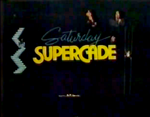
|
1983-1984 | 97 | Ruby-Spears Productions | An animated television series based on the many different arcade games popular at the time. There were different segments for different games, like Frogger. The series included Donkey Kong and Donkey Kong Jr. segments which featured Mario, Pauline, Donkey Kong and Donkey Kong Jr. |
| Les Trésors de Super Mario | 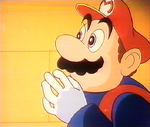
|
1989 | N/A | Bandai France and IDDH | A short-form television series that promoted the NES in France. The show featured footage of various NES games interrupted with animated segments with Mario. |
| The Super Mario Bros. Super Show! | 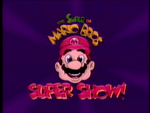
|
1989 | 65 | DIC Entertainment | The first Super Mario cartoon produced by DIC Entertainment, the show featured both a live segment and an animated segment. The show was mainly based around Super Mario Bros. and Super Mario Bros. 2. On Fridays, the show would play an animated Legend of Zelda segment featuring characters from the games like Link and Princess Zelda, but would still have live-action Super Mario segments. |
| Captain N: The Game Master | 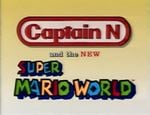
|
1989-1991 | 34 | DIC Entertainment | This cartoon featured the character of Kevin Keene being sucked into Videoland, where many different Nintendo characters and elements from several series made an appearance. Characters from the Super Mario franchise such as Donkey Kong and Donkey Kong Jr. were featured. |
| King Koopa's Kool Kartoons | 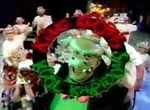
|
1989-1990 | N/A | DIC Entertainment | A live action show featuring a man dressed up and playing the role of King Koopa, the show featured a live audience which consisted of children. At the end of the episode, the man in the suit would give away prizes to winners, such as a Power Glove. |
| Club Mario | 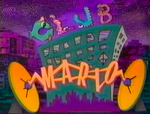
|
1990 | 65[1] | DIC Entertainment | During the summer of 1990, during broadcasts of The Super Mario Bros. Super Show!, the live action segments were replaced by Club Mario, which featured a group of teenage Mario fans. |
| The Adventures of Super Mario Bros. 3 | 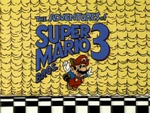
|
1990 | 26 | DIC Entertainment | A continuation of The Super Mario Bros. Super Show!, the series was based off the Famicom and NES title of Super Mario Bros. 3. It introduced the Koopalings to the DIC Entertainment line of Super Mario cartoons, and included countless new elements from Super Mario Bros. 3, which had been released in North America that same year. |
| The Super Mario Challenge | 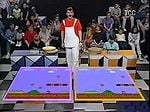
|
1990-1991 | N/A | N/A | This game show of sorts featured John Lenahan dressed as Mario, and having children complete against one another in the first three Super Mario games. |
| Super Mario Club | 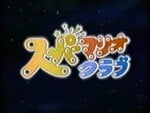
|
1990-1993 | N/A | TV Tokyo and Maxcom | A Japanese variety show that features trivia, tournaments, news, and previews featuring games for the Famicom, the Super Famicom, and the Game Boy. |
| Super Mario World | 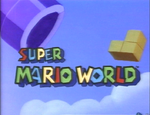
|
1991 | 13 | DIC Entertainment | A continuation of The Adventures of Super Mario Bros. 3, this show was the last actual animated series produced by DIC. It featured characters and elements from Super Mario World, which had been released in North America just a month before the show started broadcasting. It introduced the character of Yoshi to the cast. |
| Captain N & The Video Game Masters | 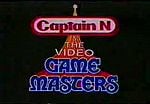
|
1992-1993 | 86 | DIC Entertainment | A compilation TV show produced for syndication, which consisted of some of the Nintendo-based cartoons DIC had produced: Captain N, The Legend of Zelda, Super Mario Bros. 3, and Super Mario World. |
| Super Mario Stadium | 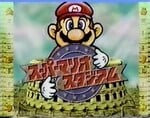
|
1993-1996 | N/A | TV Tokyo and Maxcom | A game show based on Nintendo that was aired on TV Tokyo from October 7, 1993 to June 27, 1996. The game show included a heavy relation to the Super Mario franchise, with many games from the franchise being advertised and played. |
| Mario All Stars | 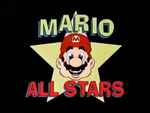
|
1994 | 40[citation needed] | DIC Entertainment | To coincide with the recent release of Super Mario All-Stars on the SNES, DIC released another compilation TV show, which mashed up the Super Mario Bros. Super Show! and Super Mario World. |
| 64 Mario Stadium | 
|
1996-2000 | N/A | TV Tokyo and Maxcom | A variety show focused on Nintendo game consoles and software that was broadcast on TV Tokyo affiliates from July 4, 1996 to September 28, 2000. It aired every Thursday from 6:30 to 7:00 pm. It is the successor to Super Mario Stadium, which had previously aired in the same Thursday 6:30 pm slot, and was renamed and renewed when sponsor Nintendo released the Nintendo 64. The Pokémon-related projects that the show implemented were carried over to Pokémon Sunday, which began airing in 2004. |
| Donkey Kong Country | 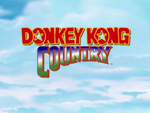
|
1996-2000 | 40 | Nelvana | Based off the first three Donkey Kong Country games, this Canadian-French-Chinese CG-animated series ran for two seasons and forty episodes. The plot revolved around Donkey Kong and the Kongs protecting the Crystal Coconut from King K. Rool and his minions. |
| Donkey Kong Planet | 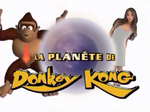
|
1996-2000 | N/A | Medialab | A children's show featuring part of the Donkey Kong Country cast, Donkey Kong Planet consisted of airing of children's series interspersed with comedic skits. It was aired exclusively in France. |
| Mario School | 
|
2000-2001 | N/A | TV Tokyo and TV Man Union | A variety show that provides information about Nintendo game consoles. It was broadcast on TV Tokyo from October 5, 2000 to March 29, 2001. It follows from Super Mario Club, but is produced by TV Man Union instead of Maxcom. Because of this, the content of the show is drastically different from the previous variety shows, such as the discontinuation of the quiz segment. |
Films
| Name | Image | Release date | Description |
|---|---|---|---|
| Super Mario Bros.: Peach-hime Kyūshutsu Dai Sakusen! | 
|
July 20, 1986 (Japan) | A Japanese-only animated movie, based off Super Mario Bros. Running for approximately one hour, it was directed by Masami Hata, written by Hideo Takayashiki, and produced by Masakatsu Suzuki and Tsunemasa Hatano. Additionally, it was produced by Grouper Studios (in co-operation with Nintendo) and distributed by Toei Company/VAP Video. It was one of the first film adaptations of a video game. |
| Amada Anime Series: Super Mario Bros. | 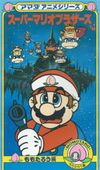
|
August 3, 1989 (Japan) | A series of three Japanese-only Mario animated films based on fairy tales. It includes the following three films: Super Mario Momotarō, Super Mario Issun-bōshi, and Super Mario Shirayuki-hime, which are based off Momotarō, Issun-bōshi, and Snow White, respectively. |
| The Wizard | 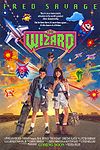
|
December 15, 1989 (US) | This action comedy film stars two teenage boys, Corey and Jimmy, who sneak out their home and set off on a trip across the country. After meeting up with a young girl, Haley, they discover that Jimmy, the emotionally disturbed little brother, has a gift for playing video games, they enter a video game competition in California. The movie features countless references to video games, and in the movies' climax, Jimmy plays Super Mario Bros. 3 for the contest at the end. |
| Super Mario Bros. | 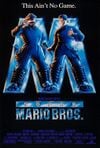
|
May 28, 1993 (US) | A live-action film adaptation of the Super Mario franchise, it was made on a budget of $42 million. It is the first live-action film adaptation of a video game, as well as the first film adapted from the Super Mario franchise to be released outside of Japan. The film follows plumber brothers Mario and Luigi as they enter Dinohattan, located in a parallel dimension to Earth, to save Princess Daisy from the evil Koopa, who has taken over Dinohattan and plots to take over Earth as well by merging it with his home world.
The film released to negative critical reception and grossed $38.9 million at the box office against a budget of at least $42 million, resulting in it being considered a commercial failure. |
| Mario Kirby Meisaku Video | 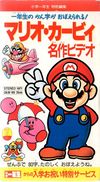
|
1993 (Japan) | An educational Japanese-only video, split into two segments: a Super Mario segment, and a Kirby segment. The Super Mario segment is based off of Super Mario Land 2: 6 Golden Coins, and it is educational in the sense that it attempts to teach Japanese children Kanji. This extremely rare tape was released on VHS, only in Japan, by Shogakukan in 1993. |
| Pixels | July 24, 2015 (US) | A live-action film starring Adam Sandler as Sam Brenner, a former arcade game champion who defends against aliens who attack Earth in the form of arcade games. Donkey Kong appears, with the aliens attacking in the form of Donkey Kong in the climax.
The film released to negative critical reception and was considered unsuccessful at the box office, grossing $244 million against a production budget of at least $88 million. | |
| The Super Mario Bros. Movie | 
|
April 5, 2023 (US) April 27, 2023 (Japan) Q1/Q2 2023 (worldwide) |
An animated film in partnership with Illumination, co-produced by Shigeru Miyamoto and Chris Meledandri (founder and CEO of Illumination). It was initially theatrically released on April 5, 2023. The film follows Mario, a plumber from Brooklyn, as he ends up in the Mushroom Kingdom and teams up with Princess Peach and Toad to save Luigi and defeat Bowser, who is intent on forcefully marrying Peach and destroying the kingdom if she refuses.
The film released to mixed critical reception, but was a box office success, grossing over $1.36 billion against a $100 million budget and breaking several box office records. |
| Untitled The Super Mario Bros. Movie follow-up | 
|
April 3, 2026 (US) April 2026 (select regions) |
An animated follow-up film to The Super Mario Bros. Movie in collaboration once again with Illumination, co-produced by Shigeru Miyamoto and Chris Meledandri. It is set to be released on April 3, 2026 in various regions, including the United States, and will be released in select territories throughout April 2026. |
Other videos
Finding Luigi - Legend of Parkour (YouTube)
Mario Kart 8 From the Pit (YouTube)
Mario Myths with Mr Miyamoto (YouTube)
The Cat Mario Show (3DS / Wii U eShop)
The Play Nintendo Show (YouTube)
Rescue V: Fearless Color Defenders (Wii U eShop / YouTube)
Frizzy's Silly amiibo Theater (YouTube)
Virus Vid (YouTube)
60-Byō Challenge! Luigi o Sukue!! (JR East trains / YouTube / Instagram / LINE)
LEGO Super Mario Adventure Zone (LEGO website / LEGO Life)
See also
- List of references in live-action television
- List of references in animated television
- List of references in film
References
- ^ The Fifth Estate May 28, 1990 page 53. Retrieved October 21, 2020


















